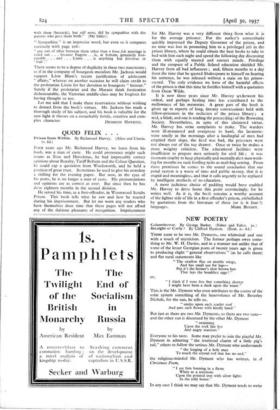QUOD FELIX • . .
FOUR years ago Mr. Richmond Harvey, we learn from his book, was a man of caste. He could pronounce aright such nouns as Zeus and Herodotus, he had impeccably correct opinions about Royalty, Tariff Reform and the Colour Question, he could cap a quotation from Wordsworth, and he held a position of great trust. Sometimes he used to give his newsboy a shilling for the evening paper. But now, in the eyes of his peers, he is no longer a man of caste. His pronunciations and opinions are as correct as ever. But since then he has done eighteen months in the second division.
He served his time, as a first-offender, in Wormwood Scrubs Prison. This book tells what he saw and how he reacted during his imprisonment. But let me warn any readers who have themselves done time that these pages will not afford any of the dubious pleasures of recognition. Imprisonment for Mr. Harvey was a very different thing from what it is for the average prisoner. For the author's correctitude quickly impressed the Deputy Governor of the prison, and no time was lost in promoting him to a privileged job in the prison library, where he could obtain the best books to take to bed with him each night and spend the following day discussing them with equally trusted and correct minds. Privilege and the carapace of a Public School education shielded Mr. Harvey from all bad influences ; and, fifteen months to a day from the time that he quoted Shakespeare to himself on hearing his sentence, he was released without a stain on his prison- record. The only evidence we have of the harmful effects of the prison is that this time he fortifies himself with a quotation from Oscar Wilde.
It is now three years since Mr. Harvey underwent his ordeal, and perhaps healing time has contributed to the mellowness of his memories. A great part of the book is given up to reports of long, literary conversations held with fellow-prisoners in the seclusion of the prison library ; a nod, a blink, and one is reading the proceedings of the Browning Society. Nevertheless, in spite of this cloistered virtue, Mr. Harvey has some complaints to make. The warders were ill-mannered and overpraae to bawl, the lavatories were smelly in the mornings after a landingful of men had emptied their slops, the food was bad, the prisoners were not always out of the top drawer. Once or twice he makes a more weighty criticism. The educational facilities were insufficient to prepare men seriously for civil life ; it was insensate cruelty to keep physically and. mentally alert men work- ing for months on such footling tasks as mail-bag sewing. From these premisses he comes to the sound conclusion that our penal system is a waste of time and public money, that it is stupid and meaningless, and that it calls urgently to be replaced by intelligent methods of re-education.
A more judicious choice of padding would have enabled Mr. Harvey to drive home this point convincingly, for he writes well. As it is, the book remains a worthy account of the lighter side of life in a first offender's prison, embellished by quotations from the literature of three (or is it four ?)


































































 Previous page
Previous page